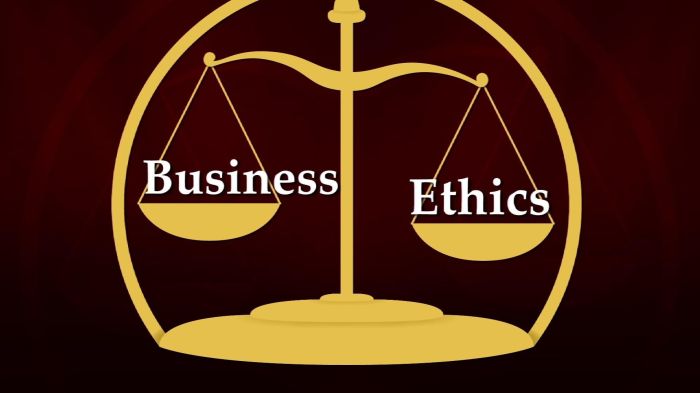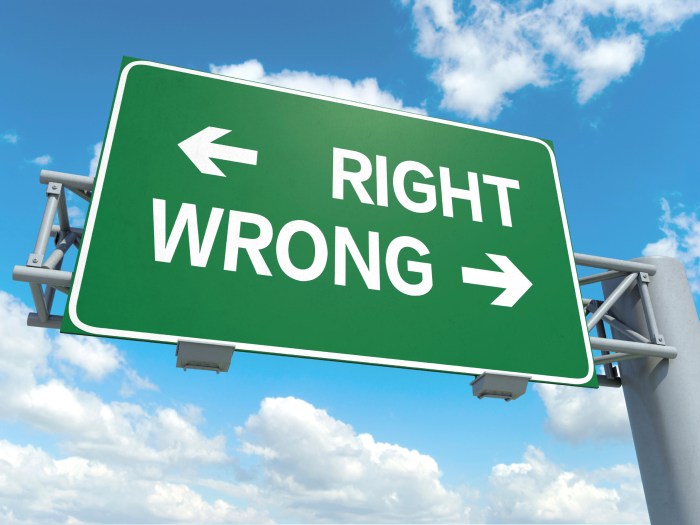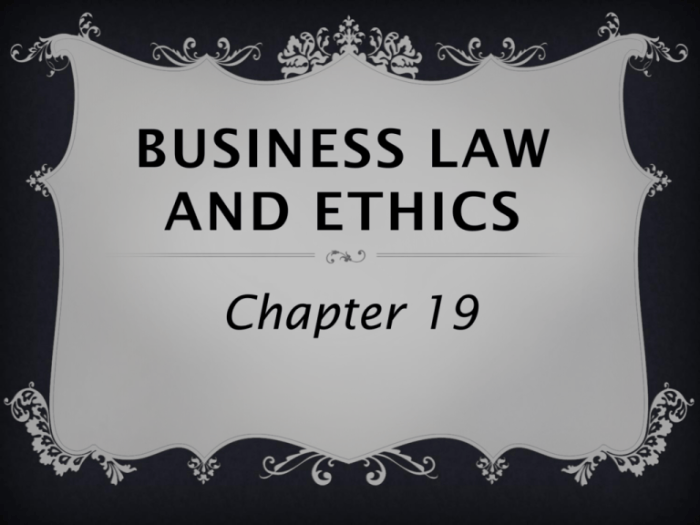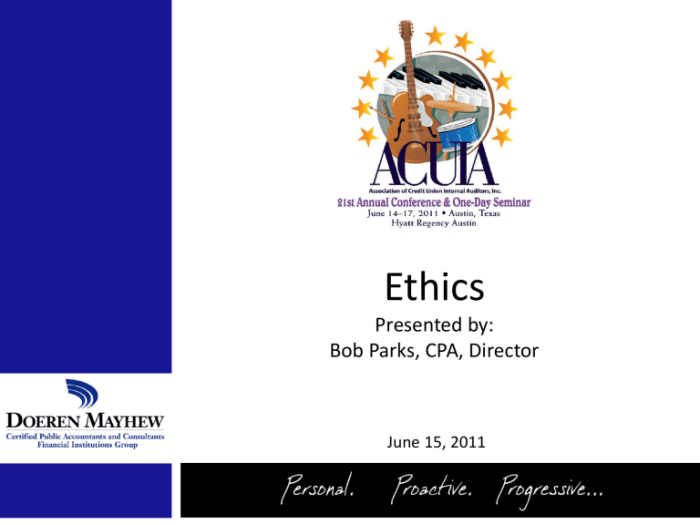Business law and ethics BPA, an intricate tapestry of legal and ethical considerations, guides organizations toward responsible growth. This article delves into the fundamental principles, legal frameworks, and ethical dilemmas that shape business practices, providing valuable insights for navigating the ever-evolving landscape of commerce.
From understanding the various types of business entities and their legal implications to exploring the complexities of contracts, torts, and property rights, this comprehensive guide empowers businesses to operate within the bounds of the law while upholding ethical standards.
Business Law and Ethics Overview

Business law and ethics establish the legal framework and moral principles that guide business operations. They ensure fair competition, protect consumers, and promote ethical conduct within the business realm.
Fundamental Principles of Business Law and Ethics, Business law and ethics bpa
The fundamental principles of business law and ethics include:
- Legality:Adhering to all applicable laws and regulations.
- Transparency:Disclosing relevant information to stakeholders and the public.
- Accountability:Taking responsibility for business actions and decisions.
- Fairness:Treating all stakeholders equitably and without bias.
- Integrity:Maintaining honesty, trustworthiness, and ethical conduct.
Ethical Dilemmas Faced by Businesses
Businesses often face ethical dilemmas that test their values and principles. These dilemmas may involve:
- Balancing profits with social responsibility.
- Protecting employee rights while maintaining productivity.
- Avoiding environmental damage while pursuing economic growth.
- Dealing with conflicts of interest.
- Handling sensitive customer data ethically.
Role of Legal Compliance in Business Operations
Legal compliance is essential for businesses to operate within the bounds of the law and avoid legal penalties. It involves:
- Identifying and understanding applicable laws and regulations.
- Developing policies and procedures to ensure compliance.
- Training employees on legal requirements.
- Monitoring and auditing compliance efforts.
- Responding appropriately to legal issues and disputes.
Legal Framework for Business

The legal framework for business establishes the rules and regulations that govern business activities, ensuring fair and ethical conduct. It provides a structure for businesses to operate within, safeguarding the rights of both businesses and individuals.
The legal framework encompasses various aspects, including the types of business entities, laws governing contracts, torts, and property rights, and the regulatory environment for businesses.
Types of Business Entities
Businesses can choose from different types of entities, each with its own legal implications and responsibilities. These include:
- Sole Proprietorship: A business owned and operated by a single individual, with no legal distinction between the owner and the business.
- Partnership: A business owned and operated by two or more individuals, who share profits, losses, and liabilities.
- Limited Liability Company (LLC): A hybrid business entity that combines the features of a sole proprietorship and a corporation, offering limited liability to its owners.
- Corporation: A legal entity separate from its owners, providing limited liability and the ability to raise capital through the issuance of stocks.
Laws Governing Contracts, Torts, and Property Rights
The legal framework also includes laws governing contracts, torts, and property rights, which protect the interests of businesses and individuals:
- Contracts: Legally binding agreements between two or more parties, outlining the terms and conditions of their business dealings.
- Torts: Civil wrongs that result in harm or injury to another person or their property, such as negligence, defamation, or assault.
- Property Rights: The legal rights associated with the ownership and use of property, including real estate, intellectual property, and personal belongings.
Regulatory Environment for Businesses
Businesses operate within a regulatory environment that imposes rules and regulations to protect consumers, promote fair competition, and ensure environmental sustainability. These regulations may cover areas such as:
- Environmental Protection: Regulations aimed at protecting the environment and reducing pollution.
- Consumer Protection: Laws and regulations designed to safeguard consumers from harmful or deceptive business practices.
- Antitrust Laws: Laws that prohibit monopolies and promote fair competition in the marketplace.
- Labor Laws: Regulations governing the relationship between employers and employees, including wages, working conditions, and safety.
Ethical Considerations in Business

Businesses operate in a complex ethical landscape, facing numerous ethical dilemmas that can impact their reputation, stakeholders, and society as a whole. Understanding and addressing ethical issues is crucial for businesses to maintain integrity, foster trust, and create a positive impact.
Key Ethical Issues Faced by Businesses
- Bribery and corruption
- Conflicts of interest
- Environmental sustainability
- Data privacy and cybersecurity
li>Employee rights and workplace safety
Ethical Theories and Their Application to Business Practices
Various ethical theories provide frameworks for businesses to navigate ethical dilemmas. Some common theories include:
- Utilitarianism:Focuses on maximizing overall well-being or happiness for the greatest number of people.
- Deontology:Emphasizes following moral rules and duties, regardless of consequences.
- Virtue ethics:Stresses developing personal virtues, such as honesty, integrity, and fairness, to guide decision-making.
Examples of Ethical Decision-Making in Business
- A company refusing to use child labor in its supply chain, despite potential cost savings.
- A CEO prioritizing employee safety over production targets during a crisis.
- A business investing in renewable energy sources to reduce its carbon footprint.
Best Practices for Business Law and Ethics
Maintaining ethical standards and adhering to legal frameworks are crucial for businesses to foster trust, build strong reputations, and ensure long-term success. Here are some best practices to promote ethical behavior in organizations:
Establishing a clear and comprehensive code of ethics that Artikels the company’s values, ethical principles, and expected conduct of employees.
Importance of Corporate Governance and Compliance Programs
Corporate governance and compliance programs are essential for ensuring that businesses operate ethically and legally. These programs provide a framework for:
- Establishing clear roles and responsibilities for ethical decision-making.
- Monitoring compliance with laws and regulations.
- Providing training and resources to employees on ethical conduct.
Role of Stakeholders in Ethical Decision-Making
Stakeholders, including employees, customers, suppliers, and shareholders, have a significant role in ethical decision-making within organizations. Their perspectives and interests should be considered when making ethical choices.
- Employees can raise concerns about unethical practices and contribute to the development of ethical policies.
- Customers can choose to support businesses that demonstrate ethical behavior.
- Suppliers can ensure that their products and services are produced ethically.
- Shareholders can invest in companies that prioritize ethical practices.
Case Studies and Examples: Business Law And Ethics Bpa

Businesses that navigate ethical challenges successfully serve as valuable examples for ethical decision-making. By examining these case studies, we can extract lessons learned and identify key factors that contribute to ethical decision-making.
One such example is Patagonia, a clothing company known for its environmental activism and ethical practices. Patagonia has implemented sustainable practices throughout its supply chain, ensuring that its products are produced in an environmentally responsible manner. The company also supports environmental causes and encourages its customers to do the same.
Business law and ethics BPA are crucial for maintaining integrity in business practices. However, let’s take a break and read about Sara and me playing tennis ( sara y yo jugar al tenis ). This entertaining story highlights the importance of teamwork and sportsmanship.
Returning to our discussion, business law and ethics BPA serve as a foundation for responsible and ethical business conduct.
Lessons Learned
- Incorporating ethical considerations into business operations can enhance brand reputation and customer loyalty.
- Transparency and accountability in ethical decision-making build trust and credibility.
- Businesses can make a positive impact on society by aligning their operations with ethical values.
Key Factors
- Strong leadership with a clear ethical vision
- Employee training and development on ethical practices
- Clear policies and procedures that guide ethical decision-making
- Regular monitoring and evaluation of ethical performance
- Stakeholder engagement and feedback
Future Trends in Business Law and Ethics

The world of business law and ethics is constantly evolving, as new technologies and global developments emerge. These trends have a significant impact on the way businesses operate and the ethical considerations they face.
Impact of Technology
- Artificial Intelligence (AI) and Automation:AI and automation are rapidly changing the workforce, leading to ethical concerns about job displacement, privacy, and algorithmic bias.
- Blockchain and Cryptocurrency:Blockchain technology and cryptocurrencies present unique ethical challenges related to transparency, anonymity, and financial regulation.
- Social Media and Data Privacy:Social media platforms collect vast amounts of user data, raising ethical concerns about privacy, data security, and the spread of misinformation.
Impact of Globalization
- Global Supply Chains:Complex global supply chains create ethical challenges related to labor practices, environmental sustainability, and human rights.
- Cross-Cultural Business:Operating in different cultural contexts presents ethical challenges related to communication, cultural norms, and social responsibility.
- International Trade and Tariffs:International trade policies and tariffs can impact ethical considerations related to fair competition, economic inequality, and national security.
Recommendations for Businesses
To adapt to these changing trends, businesses should consider the following recommendations:
- Stay Informed:Keep up with emerging legal and ethical issues through industry publications, conferences, and legal counsel.
- Foster a Culture of Ethics:Create a company culture that values ethical behavior and provides clear guidelines for employees.
- Use Technology Responsibly:Implement AI and automation systems with ethical considerations in mind, ensuring transparency, fairness, and privacy.
- Address Global Challenges:Engage with global supply chains and cross-cultural business practices responsibly, addressing labor rights, environmental concerns, and social impact.
Question Bank
What are the key ethical issues faced by businesses?
Businesses face a wide range of ethical issues, including conflicts of interest, insider trading, environmental sustainability, data privacy, and fair labor practices.
How can businesses promote ethical behavior?
Businesses can promote ethical behavior by establishing clear ethical guidelines, providing ethics training for employees, and creating a culture of accountability and transparency.
What is the role of stakeholders in ethical decision-making?
Stakeholders, including customers, employees, shareholders, and the community, play a crucial role in ethical decision-making by providing input and holding businesses accountable for their actions.